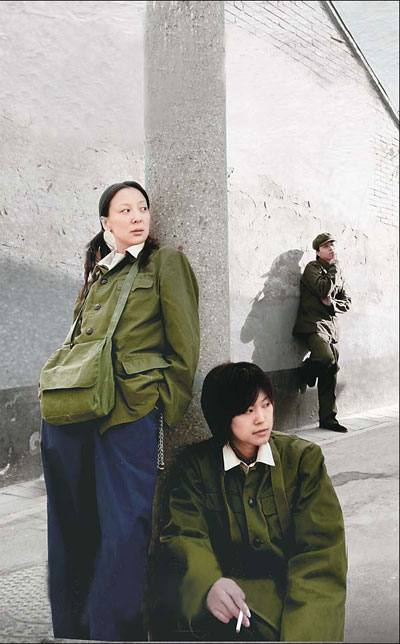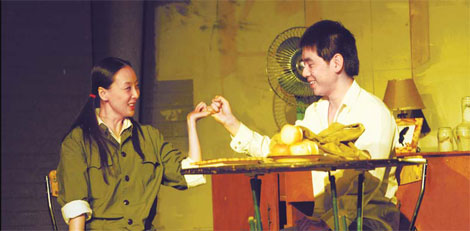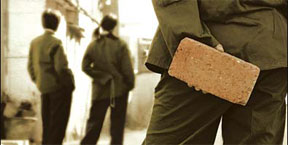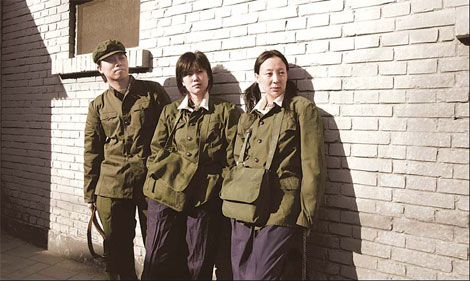Culture
Nostalgic play recalls dreams of lost youths
By Zhang Zixuan (China Daily)
Updated: 2010-07-16 09:29
 |
Large Medium Small |
 |
|
Poster for experimental drama Red Dream. [China Daily] |
Stuck between protecting the object of his secret love from rowdy teenagers and not hurting others, Sun Feng, a junior high school boy, smacks his own face with a brick. It is just one striking scene from nostalgic drama Red Dream, exploring subjects of love and friendship among several post-70s teenagers in 1985.
The story begins with a vivid group fight. The audience is disturbed by increasing noise from the back of the theater. When they look back, a small group of junior high school students, dressed in uniforms, rush in to catch a boy from another school.
The boy is beaten by the group because he has stolen money from one of their classmates.
 |
|
Li Xiaohong's classmate Sun Feng promises to catch an Isabella, a rare kind of butterfly.[China Daily] |
The leader of the gang is a girl called Li Xiaohong. She is a girl who studies well but uses violence to settle disputes. When caught in a dangerous situation with a gang of "bad boys", Li benefits from Sun's unusual approach and the teenagers run for the hills. Sun promises Li that he will catch Isabella, a rare kind of butterfly, for her. Sadness strikes later though when Li learns that Sun has died catching butterflies - her life changes forever.
"Red Dream is dedicated to our departed youth and that simple but happy period without cellphones," director Guan Haoyue, himself a post-70s Beijinger who grew up in a hutong, wrote in a post about the drama.
Guan said a typical memory of his generation was being "dressed in a green uniform with a brick ready for every fight".
Ding Dongjie, the screenwriter of the play and another post-70s Beijinger, agrees with Guan. He said it was important to keep everything genuine, even the swear words.
"Good or bad, they were a part of real life," Ding said. "It would be hypocritical to remove them."
The screenwriter attributed the characters' rebellious attitude to vigorous hormones and, most importantly, changes in social ideology.
 |
|
Li Xiaohong (right) and her classmates lean against a wall before joining a fight.[China Daily] |
"They were educated in the spirit of class struggle," he said. "But when society suddenly changed in the 1980s, they were somewhat lost."
Song Qingnan, who played Sun Feng in the drama, echoed Ding's opinion.
"These weren't bad kids. They were actually just trying to set themselves free emotionally."
Performed more than 100 times, Red Dream has aroused a heavy following.
Su Jun, a Beijing local born in 1974, was amazed by the authenticity of the stage props, such as a banner reading "Study hard and make progress every day", an iron pencil box and a Flying Pigeon bicycle.
"The desk, the dress, the language. Everything was so familiar," he said.
Another audience, Jiang Yi, was deeply moved by the start of the drama - an actor, playing the role of a class monitor, asked audiences to put on red scarves and perform eye exercises to music from the 1970s.

"It was great when I remembered how to tie my red scarf," said Jiang, who said she cried several times when watching the play.
Liu Nini, who played Li Xiaohong, was confident the strong regional accent wouldn't hamper audience understanding. "Some of my foreign friends, who don't understand any Chinese, were enchanted by the atmosphere of the play," she said.
"The Beijing slang is just decoration," Ding agreed. "The core theme is love, which is a universal subject understood by everyone."
| 分享按钮 |